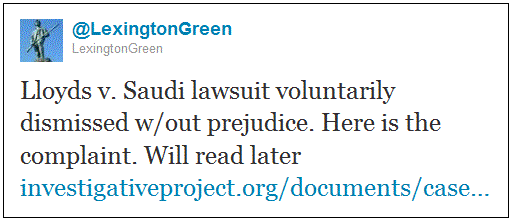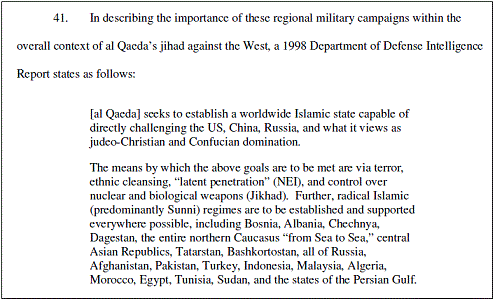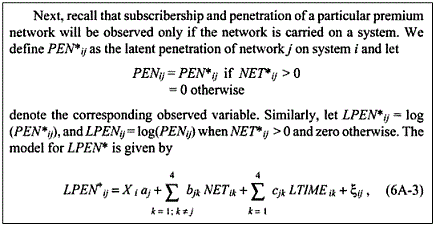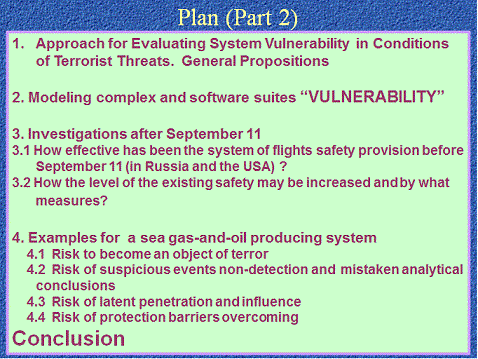[ by Charles Cameron — Limbaugh, “Christianity” of the Lord’s Resistance Army, Uganda, sectarianism, RJ Rushdoony ]
.

flag of the Lord’s Resistance Army — Wikipedia
Matt Yglesias trumpets “Rush Limbaugh Endorses The Lord’s Resistance Army” on ThinkProgress today, and goes on to say:
I don’t have a really strong view on whether or not it’s advisable to dispatch a small number of US combat troops to help fight the Lord’s Resistance Army. My instinct is to be skeptical. I want to see less military intervention, not more. But Rush Limbaugh’s instinct is to embrace brutal murderers…
That last sentence is an over the top ad hominem attack, if you ask me. But Limbaugh himself is so far over the top he’s almost reached the bottom.
Limbaugh may not be embracing or endorsing Joseph Kony‘s Lord’s Resistance Army, but this is some of what a transcript of his show has to say about them:
Lord’s Resistance Army are Christians. They are fighting the Muslims in Sudan. And Obama has sent troops, United States troops to remove them from the battlefield, which means kill them.
The transcript shows that Rush draws at least some of his knowledge of the subject from a report by Jacob Tapper of ABC News, which is mentioned in Limbaugh’s second sentence with a link provided at the end of his transcript.
1.
The Limbaugh transcript ends after a caller has apparently updated Limbaugh on some of the facts:
Is that right? The Lord’s Resistance Army is being accused of really bad stuff? Child kidnapping, torture, murder, that kind of stuff? Well, we just found out about this today. We’re gonna do, of course, our due diligence research on it. But nevertheless we got a hundred troops being sent over there to fight these guys — and they claim to be Christians.
Due diligence? Isn’t that something you do before you blurt?
If Limbaugh had continued to the end of the 12 paragraph ABC report he referenced, he’d have read this quote from the 2010 Statement by the President on the Signing of the Lord’s Resistance Army Disarmament and Northern Uganda Recovery Act of 2009:
The Lord’s Resistance Army preys on civilians – killing, raping, and mutilating the people of central Africa; stealing and brutalizing their children; and displacing hundreds of thousands of people. Its leadership, indicted by the International Criminal Court for crimes against humanity, has no agenda and no purpose other than its own survival. It fills its ranks of fighters with the young boys and girls it abducts. By any measure, its actions are an affront to human dignity.
Is Limbaugh in need of an intern to do some fact-checking, perhaps?
2.
Here’s Limbaugh again:
Now, up until today, most Americans have never heard of the combat Lord’s Resistance Army. And here we are at war with them. Have you ever heard of Lord’s Resistance Army, Dawn? How about you, Brian? Snerdley, have you? You never heard of Lord’s Resistance Army? Well, proves my contention, most Americans have never heard of it, and here we are at war with them.
I know I’ve been tracking them for quite a while myself, because I quoted the estimable Helena Cobban‘s JustWorldNews piece announcing a “second-stage peace accord” between the Ugandan government and LRA in May 2007 — but I also have a 2002 article from the UK’s Department for International Development (DFID) magazine Developments, buried in among the files I brought over from an older computer, which contains one striking piece of evidence that I’d love to follow up on.
In this article, no longer available at the DFID site, but which can now be retrieved from the Internet Archive — DFID Media Fellow Maya Deighton reports as though it’s common knowledge that Kony at one point converted to Islam:
The rebels’ leader is a religious fanatic called Joseph Kony, who hides out for most of the time in southern Sudan.
Kony manages to combine a heady blend of occultism, born-again Christianity, and most recently, a much-proclaimed conversion to Islam, with his campaign of terror and child abduction.
3.
Muslim, Christian, spiritualist, shamanic, syncretistic, tribal, or merely incoherent in belief, the LRA has long been known for its brutality. Deighton continues:
Known as the Lord’s Resistance Army (LRA), the force of 10,000 recruits is a rag-tag one. It is made up of highly powerful commanders, who roam in the vast, wild bushlands of northern Uganda and southern Sudan, with bands of abducted children, forcing them to take part in brutal raids on their own communities.
The commanders instruct the children to take part in arcane rituals, including smearing their bodies with shea nut oil, which they claim will magically protect them from enemy bullets.
In sprees of frenzied violence, the children burn and loot whole villages, raping women, abducting more children of both sexes and killing men, as they rampage through.
During the attacks, the rebels leave their unmistakable trademark by cutting off their victims lips, ears and even legs.
If Limbaugh is so far over the top as to be close to bottoming out, Kony is crazed enough for me to forgo my usual scruples and apply the nauseating term, batshit.
4.
And hey – even JR Rushdoony‘s Chalcedon Foundation has known about this for ages. Their magazine featured an interview by Lee Duignon with Uganda’s Ambassador to the US, Edith Ssempala, in May 2005, titled Uganda’s War with ‘the Devil’. I don’t think Rush Limbaugh or his people had read that piece, either.
It begins by setting the time-frame – and remember, this was published in 2005:
“We need your prayers” to bring an end to “a spiritual war” that has ravaged northern Uganda for 19 years, Uganda’s Ambassador to the United States appealed to American Christians.
It’s not every day you see the “spiritual warfare” meme more readily associated with C Peter Wagner and the NAR cropping up in a Rushdoony publication…
In an exclusive interview with Chalcedon, Ambassador Edith Ssempala discussed her country’s war against the Lord’s Resistance Army – a terrorist organization that has, in the name of God, murdered tens of thousands, driven more than a million people from their homes, and abducted many thousands of children to be slaves or “soldiers.”
“I prefer to call it the Devil’s Resistance Army,” the ambassador said. “It’s blasphemous to call it ‘the Lord’s.’ All those atrocities in the name of God.”
[ … ]
Self-proclaimed “General” Joseph Kony, who claims he has supernatural powers conferred on him by the Holy Spirit, created the LRA and still leads it. The government has tried many times to negotiate with him, Ms. Ssempala said – but it’s impossible to negotiate with a madman.
“Those who’ve met with him say they can’t make any agreement with him,” the ambassador said. “He always says he needs to consult the spirits.”
5.
Okay, here’s another interesting bit:
Publicly, Kony says his mission is to impose the Ten Commandments on Uganda as law. Uganda’s Christians, of course, already believe in the Ten Commandments.
“He says he wants to establish the Ten Commandments as the nation’s law, and he violates every one of them,” Ms. Ssempala said. “Nobody knows what he really wants. He’s motivated by pure evil. He maims, he murders, he rapes. He makes children do these things as their initiation into his army. It’s demonic.”
Also of interest is the LRA’s statement of intent, which Limbaugh quotes approvingly:
Lord’s Resistance Army objectives. I have them here. “To remove dictatorship and stop the oppression of our people.” Now, again Lord’s Resistance Army is who Obama sent troops to help nations wipe out. The objectives of the Lord’s Resistance Army, what they’re trying to accomplish with their military action in these countries is the following: “To remove dictatorship and stop the oppression of our people; to fight for the immediate restoration of the competitive multiparty democracy in Uganda; to see an end to gross violation of human rights and dignity of Ugandans; to ensure the restoration of peace and security in Uganda, to ensure unity, sovereignty, and economic prosperity beneficial to all Ugandans, and to bring to an end the repressive policy of deliberate marginalization of groups of people who may not agree with the LRA ideology.” Those are the objectives of the group that we are fighting, or who are being fought and we are joining in the effort to remove them from the battlefield.
Nothing much to argue with there.
But hey, Rushdoony must have felt a little confused by these guys. His massive Institutes of Biblical Law is dedicated to the proposition that now and for ever, Old Testament law should be the foundation of civil law – on page 18 he writes that “one God, one law” propounded in Deuteronomy 6.4 (the Shema Yisroel) is “the declaration of an absolute moral order to which man must conform”. Joseph Kony as quoted above seems to be pretty much in agreement with that.
6.
But then in the LRA’s own official presentation, A Case for National Reconcilation, Peace, Democracy and Economic Prosperity for All Ugandans, we find:
3.4. Propaganda by the Museveni regime and the media that the LRA is a group of Christian fundamentalists with bizarre beliefs whose aim is to topple the Museveni regime and replace it with governance based on the Bible’s ten commandments are despicable and must be rejected with all the contempt it deserves.
Hunh?
Then again, we’re talking about Uganda here, which also gave us the Movement for the Restoration of the Ten Commandments of God – the Catholic splinter group which set fire to its church with four or five hundred adherents locked inside on March 17, 2000 – after their December 31st 1999 end of days had been postponed in a vision by the Virgin Mary.
So perhaps it’s understandable if Kony’s emisary seeks to distance himself from the associations brought up by mention of the “Ten Commandments” in a Ugandan context, and sets forth a list of LRA objectives that sounds passable enough that Limbaugh can quote them with approval.
7.
And Rush, we’re still waiting for that overdue diligence…













